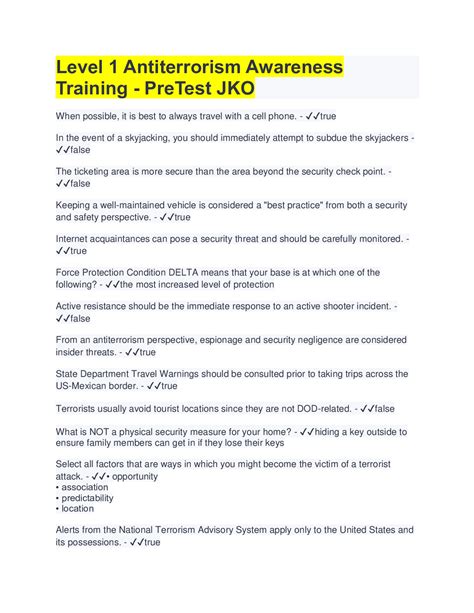Sherly
You need 3 min read
Post on Feb 03, 2025
Table of Contents

Level I Antiterrorism Awareness Training Test: A Comprehensive Guide
Are you preparing for your Level I Antiterrorism Awareness Training test? This comprehensive guide will help you understand the key concepts, prepare effectively, and confidently pass your exam. We'll cover everything from the importance of antiterrorism awareness to specific topics typically included in the test.
Understanding the Importance of Antiterrorism Awareness
Level I Antiterrorism Awareness training is crucial for maintaining a safe and secure environment. It equips individuals with the fundamental knowledge and skills necessary to identify, report, and respond to potential terrorist threats. This training is not just for security personnel; it's vital for anyone working in a potentially vulnerable environment or simply wishing to contribute to national security.
Key Areas Covered in Level I Training:
The specific content of Level I Antiterrorism Awareness training can vary depending on the organization providing the training, but generally covers the following key areas:
- Identifying Terrorism: Understanding the definition of terrorism, different types of terrorist attacks, and the motivations behind terrorist acts. This section often includes case studies and examples to illustrate key concepts.
- Recognizing Potential Threats: Learning how to identify suspicious activities, individuals, or packages. This often involves understanding common terrorist tactics and techniques. Situational awareness is a crucial component.
- Reporting Procedures: Knowing the proper channels and procedures for reporting suspicious activities. Understanding the importance of timely and accurate reporting is paramount. This often includes learning about specific reporting hotlines or online platforms.
- Security Procedures: Understanding basic security measures and protocols, including access control, surveillance, and emergency response plans. This section emphasizes personal responsibility in maintaining a secure environment.
- Responding to Threats: Knowing how to react appropriately to a potential terrorist threat, including evacuation procedures and emergency response protocols. This often involves practicing different scenarios and developing a personal plan of action.
Preparing for the Level I Antiterrorism Awareness Test
Effective preparation is key to success. Here's a structured approach to ensure you're ready for your test:
1. Review Training Materials Thoroughly:
Carefully review all provided training materials, including presentations, handouts, and any supplementary resources. Pay close attention to key definitions, concepts, and procedures.
2. Practice Active Recall:
Don't just passively read the materials. Actively test your knowledge by trying to recall key information without looking at your notes. This strengthens memory retention.
3. Focus on Key Concepts:
Identify the core concepts emphasized throughout the training and dedicate extra time to understanding them thoroughly. This includes understanding the "why" behind procedures, not just the "how."
4. Utilize Practice Questions (If Available):
If practice questions or quizzes are provided, utilize them to assess your understanding and identify any weak areas. This helps you gauge your readiness and pinpoint areas needing further review.
5. Understand Test Format:
Familiarize yourself with the test format. Is it multiple choice? True/false? Essay? Knowing the format will help you manage your time effectively during the exam.
Beyond the Test: Maintaining Antiterrorism Awareness
Passing the Level I Antiterrorism Awareness test is just the first step. Maintaining a high level of awareness is an ongoing process. Stay informed about current events, security threats, and best practices. Continuously update your knowledge and skills to contribute to a safer and more secure community.
Keywords: Level I Antiterrorism Awareness Training, Antiterrorism Awareness Test, Security Training, Terrorism Awareness, Threat Identification, Reporting Procedures, Security Protocols, Emergency Response, Situational Awareness, Test Preparation
This comprehensive guide should help you prepare for and succeed in your Level I Antiterrorism Awareness Training test. Remember, your contribution to a safer environment starts with awareness and preparedness.
Thanks for visiting this site! We hope you enjoyed this article.
